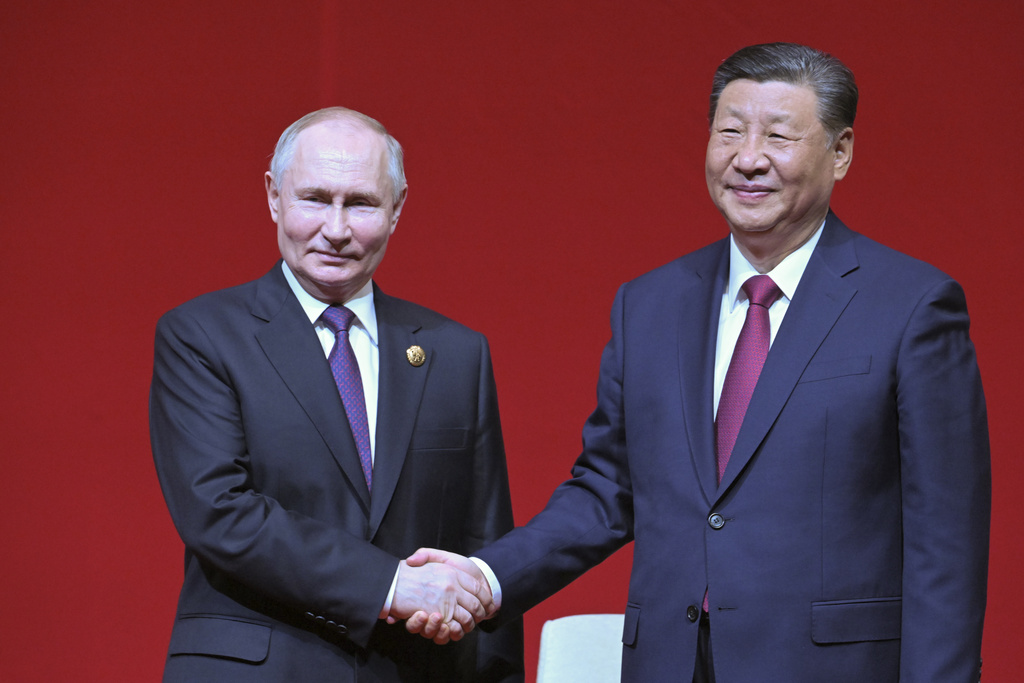Vladimir Putin, Xi Jinping Embrace at Beijing, but Will This Marriage of Convenience Blossom Into a Romance?
They’ve eyed one another with suspicion for centuries, and not so long ago they were exchanging shots across the Amur River in Siberia.

Call it a marriage of convenience, but the embrace between the leaders of America’s two Eurasian foes, President Putin and President Xi, raises the question of how long their romance will last.
While the Chinese and Russian dictators, meeting at Beijing, profess the strength of their relationship, they can hardly dispel historic hostilities beneath appearances.
“Russia has every interest in destabilizing NATO,” observed a former Asia director on the National Security Council, Michael Green. “The Chinese are worried that North Korea is not listening to them.”
Those contrasting aims epitomize much deeper differences as outlined by Mr. Green, a key adviser on Asia in the White House for five years during the George W. Bush presidency.
“It’s a tough situation and only benefits North Korea,” Mr. Green, now at the University of Sydney, tells the Sun. “The Russians are firing North Korean shells against the Ukrainians, and the Ukrainians are firing South Korean shells at Russia.”

So where does that leave China? While Mr. Putin is in Beijing begging Mr. Xi for still more aid, the Chinese president is reluctant to go beyond economic deals – and his own plan for winding down the war.
North Korea, meanwhile, “is not just sending munitions,” said the Rand Corporation’s long-time Asia analyst, Bruce Bennett, at a forum at Seoul sponsored by South Korea’s Asan Institute. “They’re sending their own people to observe the battlefield.”
No matter how deeply Mr. Xi affirms China’s bond to Russia, America and China also “have converging interests,” said a former British diplomat, John Everard, who served as Britain’s ambassador to North Korea from 2006 to 2008.
“China is as concerned as the U.S. about North Korean nuclear tests,” he told the Asan forum. “Pyongyang would like to be able to play China versus” Russia — a reminder of how Pyongyang courted both Beijing and Moscow for aid before the collapse of the Soviet Union in 1991.
As long as Russia counts on North Korea for armaments ranging from missiles to artillery shells, Mr. Everard doubts Moscow “is exercising any restraint” over the North’s nuclear ambitions. By contrast, “China has imposed real constraints,” he said, dissuading North Korea’s Kim Jong-un from ordering any nuclear tests since 2017.
China and Russia have grown closer in recent years, as seen in their united opposition in the Security Council to American attempts to impose new sanctions on North Korea, but they’ve eyed one another with suspicion for centuries. In the 1960s and 1970s, they were exchanging shots across the Amur River in Siberia.
“Despite these areas of convergence, Russia and China are also driven apart by historical animosities,” writes a senior fellow of the Asia Society, Philipp Ivanov. “Their partnership is regularly tested by a lack of strategic trust, divergent foreign policy agendas, and power asymmetry.”
The suspicion with which China views Russia is clear from the irony of the Chinese agreeing to top-level meetings with North Korea’s arch enemies before and after the Xi-Putin summit.
South Korea’s foreign minister, Cho Tae-yul, was in Beijing this week to see his Chinese counterpart, Wang Yi. More incredibly, South Korea’s President Yoon is hosting a “trilateral summit” of the leaders of Japan and China at Seoul on May 26.
No, Mr. Xi won’t be there. He’s sending his premier, Li Qiang, technically his equal in rank, to meet not only Mr. Yoon but also Japan’s prime minister, Fumio Kishida. Mr. Li will be certain to say exactly what Mr. Xi wants as all three affirm their commitment to peace and get down to sorting out sensitive economic issues.
Meanwhile, Mr. Putin is expected again to display his infatuation with Mr. Kim, who agreed to shower him with weapons when they met at the Cosmodrome by the Amur River in September.
Mr. Putin “will be going back to North Korea for another summit,” predicts the senior fellow for North Korea at the Council on Foreign Relations, Sue Mi Terry. “North Korea has complete impunity. For the foreseeable future, there’s a convergence of interests between Russia, China and North Korea.”

